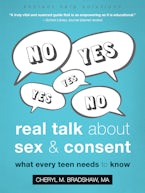By Cheryl M. Bradshaw, MA, author of Real Talk About Sex and Consent
We have all entered into a brave new world of masks and social distancing. And interestingly, it is finally becoming normalized to think about who we have physical contact with and if it is wanted or consented to, across the board. We are actively keeping our distance and rethinking what intimacy we have and with whom. We are having discussions and talking more openly about physical space and boundaries, which is the first step toward normalizing consent.
As the world pauses, and we have slowed down our dating lives and our social lives, we take a collective inhale breath and can reconsider how we want to reenter the world of intimacy. Right now is the exact right moment to stop and reflect on the realities of consent before diving back into the dating world in earnest.
Most of us know the basics of what consent should look like. We know we should ask for an affirmative agreement from a partner before engaging in an intimate act. But many people aren’t aware of the very important nuances that can impact our ability to ascertain true consent from a partner.
One of these factors is our ability to feel safe with a partner. This feeling of safety crosses four dimensions: physical safety, social safety, emotional safety, and of course, legal safety. A simple “yes/no” exchange does not give us the full picture of what it feels like to truly have a safe encounter with a partner with total consent.
There is also the acronym I use in the book, Real Talk About Sex and Consent, called HOT SPICE. These are aspects of consent that we all need to know and live in every intimate situation, with the same simple awareness that we now all put on masks before entering a store. The first part of the acronym, HOT, stands for Honest, Ongoing, Talked-About consent. This is where we are honest with ourselves and our partners, communicating ongoing through an interaction using both verbal words and physical body language together. And finally, SPICE, which stands for Specific, Present-Moment, Informed, Changeable, and Enthusiastically Affirmative. This means that consent is specific to the exact act in question, given in the moment by the person themselves in an informed manner of any risks or personal information that pertains to the interaction, and in a way that is enthusiastically affirmative and can be withdrawn at any moment in time for any reason.
Many people may have once said that our ability to change how we ask for and give consent in our society was something that we “just couldn’t change.” That it would be too hard to change the way an entire society thinks about sexual interaction and what is “normal.” However, just looking out your window these days at the mass changes our society is truly capable when we work together for the greater common good should tell us we are capable of anything.
Now is the time to teach our teens (and ourselves) the true meaning of consent. This book will take you through every nuance about consent that you didn’t even know you didn’t know. When social distancing is lifted and we all step back into our vibrant intimate lives in earnest, let’s step back in together with a new and totally informed perspective. Let’s make the world a better and safer place, together.
Cheryl M. Bradshaw, MA, is a registered psychotherapist working in private practice, and author of How to Like Yourself—a self-esteem guide for teens—and The Resilience Workbook for Teens. She has been featured on various television shows, radio shows, and podcasts, including Breakfast Television, Global’s The Morning Show, CBC Radio, and Today’s Parent. Her first book was also selected as a 2016 Foreword INDIES finalist for the 2016 Young Adult Nonfiction category. In addition, Cheryl received the inaugural Outstanding Alumni Award from Yorkville University in 2017. Bradshaw served as a counselor at both Sheridan College and the University of Guelph. She also has a background in teaching, and continues to work with and volunteer with schools and charities to talk about youth and young adult mental health, self-esteem, and also to support parents with their teens.



 Part 2: What to Do When a Client Is Participating in Self-Judgment?
Part 2: What to Do When a Client Is Participating in Self-Judgment?